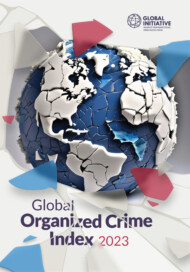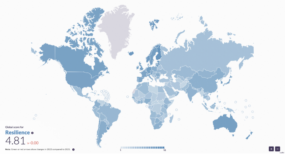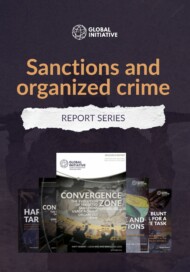Posted on 27 May 2024
The body of criminal justice treaties dealing with organized crime, of which the United Nations Convention against Transnational Organized Crime (UNTOC) is the central pillar, has been built on the assumption that the state institutions responsible for implementing the treaties are fundamentally sound and genuinely motivated to combat organized crime.
While this is not to deny, of course, that public officials may be involved in organized criminal conduct, the assumption is that, in most cases, the problem has not spread to the point of corrupting the entire governance systems of state parties. Poor treaty implementation records tend to be attributed less to states’ unwillingness to address organized crime than their lack of resources or expertise for doing so. As a result, international and multilateral agencies responsible for supporting implementation efforts tend to prioritize technical assistance as a critical tool for building institutional capacity, particularly in developing countries.
This paradigm has come increasingly under strain in recent years as a result of the proliferation of countries with high levels of state-embedded criminality, which raises a simple but troubling question: how can we reasonably expect those in charge of implementing criminal justice treaties to do so if they are the part of the problem? Does this not set the stage for a fundamental conflict of interest?
As the Global Organized Crime Index 2023 identified, ‘criminal actors that are part of or act from within the state apparatus continue to be a major impediment to the development of effective anti-organized crime strategies’. Compared to the findings of the 2021 Index, there has been a substantial increase in the average global score of state-embedded criminal actors, which rose by 0.20 points to 5.95 (out of 10, with 10 being the most severe). These actors are found to be dominating the criminal landscape as the primary entities involved in organized crime worldwide. Out of the 193 countries surveyed, an alarming 55 received a score of 8 or higher in this category. The Index also notes that the ‘countries most affected by the impact of state-embedded actors continue to be primarily authoritarian regimes’, with 54% classified as such by the Economist Intelligence Unit’s 2022 Democracy Index.
In extreme cases, organized crime permeates state structures to such an extent that they are chronically and systematically diverted from their original mandates. A common feature of so-called mafia states, kleptocracies and narco-states is the influence of powerful groups that manage to co-opt state institutions and transform key decision-making processes into tools for private or criminal ends. This can manifest itself in a number of ways, such as the appointment of loyalists to parliamentary positions; the curtailment of the independence of the judiciary and the functions of the executive, including law enforcement; and the use of administrative discretion in ways that serve criminal interests. In addition, constraints may be placed on journalists and media outlets, preventing them from informing the public about issues such as the mismanagement of public funds and the connections between public authorities and criminal elements.
Under these conditions, we may begin to see a more pronounced ‘political’ use of the classical cooperation channels outlined in the international criminal justice treaties. A typical example is the fabrication of criminal charges to pursue political dissidents abroad through extradition procedures, a process that is clearly facilitated in authoritarian countries. In this vein, a 2022 study commissioned by the European Parliament has suggested a link between the authoritarian developments taking place in many countries and the growing risk of abuse of INTERPOL Red Notices (international requests for the location and provisional arrest of a person pending extradition) for political purposes. As noted in an article published in the Harvard International Review in the same year, this system is vulnerable to exploitation by authoritarian countries.
Countries with a high level of involvement of state-embedded actors in criminal activities are likely to continue to be involved in the various mechanisms for monitoring the implementation of treaties aimed at combating organized crime (e.g. the Conference of the Parties to the UNTOC), and even to participate in negotiations on developing new criminal justice instruments. However, their engagement is unlikely to be directed towards advancing the goals set out in these treaties, but rather to serve as diplomatic posturing to maintain the appearance of commitment against organized criminal behaviour, in which they may be implicated.
In the worst cases, the aim may be to block initiatives by other states that could have a significant positive impact on the fight against organized crime. Indeed, today’s authoritarian states tend to maintain the outward trappings of legality, which is evident not only domestically but also in the international domain. As Moisés Naím, former executive director of the World Bank, astutely observes in his latest book, The Revenge of Power: How Autocrats Are Reinventing Politics for the 21st Century: ‘What the twentieth-century autocrats did by force, their twenty-first-century counterparts do by stealth. While their twentieth-century predecessors set out to destroy the rule of law with brute force, twenty-first-century autocrats undermine it through the corrosive power of insincere mimicry.’
We can also expect to see an increasing reliance on sanctions – including asset freezes, travel bans and arms embargoes – enacted by the executive branches of governments, with a particular focus on organized crime. In a recent paper that charts the evolution of targeted sanctions against organized crime, Matt Herbert and Lucia Bird Ruiz-Benitez de Lugo suggest that ‘the international community will increasingly turn to sanctions as a tool for addressing organized crime activity, given the growing recognition that, more than simply a criminal justice issue, organized crime is now also a national security and economic threat’. It should be added that more frequent recourse to sanctions may well be an inevitable outcome in situations where the traditional channels of collaboration in criminal matters (law enforcement cooperation, extradition, mutual legal assistance) prove to be unusable due to the growing number of criminal actors at the helm of public institutions in many countries.
The effectiveness of traditional international cooperation channels in the criminal justice domain – notably, extradition and mutual legal assistance – depends critically on the existence of reasonable levels of trust between requesting and requested states. Such trust will be far from assured if the current trend of polarization, conflict and ‘great power competition’ (intensified rivalry between the US, China and Russia) continues. The current geopolitical upheaval will have a severe impact on the modalities for fighting organized crime, opening up scenarios that are difficult to predict. What can be assumed with some certainty, however, is that the current treaty framework on organized crime will become even more fragile and inoperative as a growing number of countries’ decision-making bodies are short-circuited by criminal actors. This may provide an incentive for the use of sanctions as a back-up plan.
Sanctions will never replace criminal justice tools, nor should they. But to the extent that they may come to acquire a more prominent role, it will be vital to ensure that all aspects of them, from entity designation to delisting, are consciously managed, that there is a proper understanding of how they fit into broader strategies against organized crime, and that they are only adopted where there is sufficient capacity to administer them. While the GI-TOC has begun to fill the research gap on targeted sanctions, with a series of reports on their use in countering organized crime, there is still a long way to go to ensure that criminal justice treaties are fit for purpose and guard against interference by state-embedded actors.
This analysis is part of the GI-TOC’s series of articles delving into the results of the Global Organized Crime Index. The series explores the Index’s findings and their effects on policymaking, anti-organized crime measures and analyses from a thematic or regional perspective.



